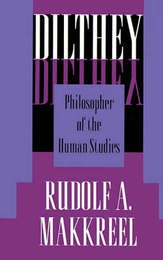
|
Dilthey: Philosopher of the Human Studies
Paperback / softback
Main Details
| Title |
Dilthey: Philosopher of the Human Studies
|
| Authors and Contributors |
By (author) Rudolf A. Makkreel
|
| Physical Properties |
| Format:Paperback / softback | | Pages:472 | | Dimensions(mm): Height 235,Width 152 |
|
| Category/Genre | Western philosophy from c 1900 to now |
|---|
| ISBN/Barcode |
9780691020976
|
| Classifications | Dewey:193 |
|---|
| Audience | | Professional & Vocational | | Tertiary Education (US: College) | |
|---|
| Edition |
Revised edition
|
|
Publishing Details |
| Publisher |
Princeton University Press
|
| Imprint |
Princeton University Press
|
| Publication Date |
3 January 1993 |
| Publication Country |
United States
|
Description
The philosopher and historian of culture Wilhelm Dilthey (1833-1911) has had a significant and continuing influence on twentieth-century Continental philosophy and in a broad range of scholarly disciplines. In addition to his landmark works on the theories of history and human sciences, Dilthey made important contributions to hermeneutics and phenomenology, aesthetics, psychology, and the methodology of the social sciences. Here Rudolf A. Makkreel interprets Wilhelm Dilthey's philosophy and provides a guide to its complex development. Against the tendency to divorce Dilthey's early psychological writings from his later hermeneutical and historical works, Makkreel argues for their essential continuity. He places Dilthey's aesthetic writings at the center of his thought and explores their philosophical implications for his theory of history.
Author Biography
Rudolf A. Makkreel is Candler Professor of Philosophy at Emory University and editor of the Journal of the History of Philosophy.
Reviews"An important contribution to our understanding of Dilthey and the critical philosophy of history."--Else N. Bulhof, The American Historical Review "A work of conscientious and penetrating scholarship."--Melvin Rader, Journal of Aesthetics and Art Criticism "This is a much-needed book on Dilthey; full-scale and authoritative, situating his thought firmly in its historical context and relating it to major criticisms, both by contemporaries and by successors."--William H. Dray, International Journal for the Philosophy of Religion
|